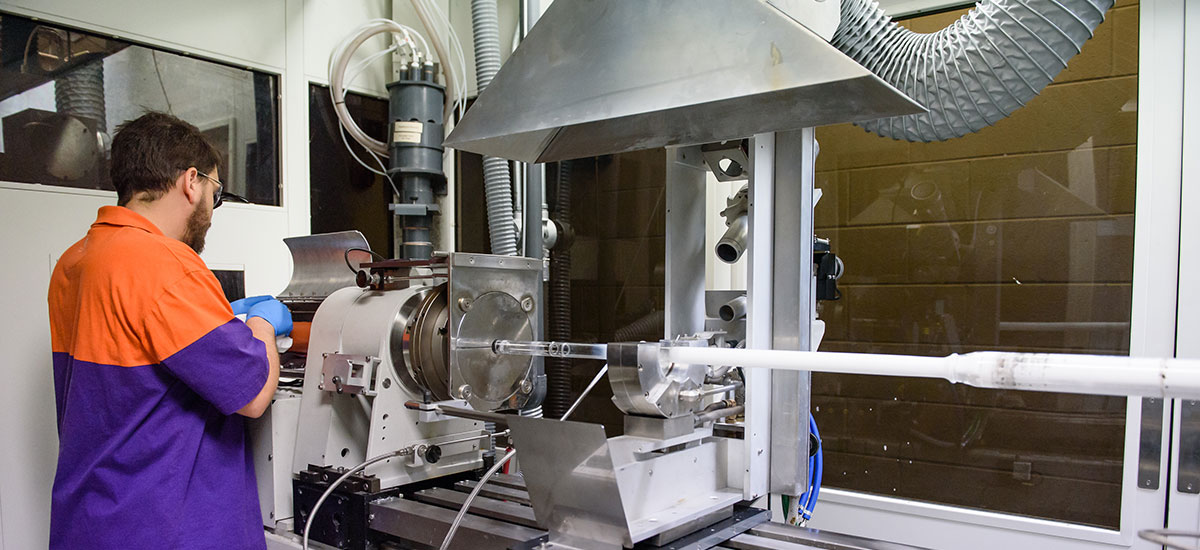
Photonics M.S. | Ph.D. Program

The Holcombe Department of Electrical and Computer Engineering at Clemson University offers interdisciplinary graduate degree programs in optical engineering, photonics science, and laser technologies in collaboration with the Graduate School and Center of Optical Material Science and Engineering Technologies (COMSET). These degree programs combine courses in optical engineering, engineering, physics, and material science to explore the fundamentals of light science and engineering. Our faculty members and instructors are leading experts in the areas of optical fiber, bio-photonics, meta-optics, high-powered lasers, semiconductor fabrication, optoelectronics, quantum materials and devices, and sensors and instrumentation.
Degree Programs
Photonic Science and Technology, M.S.
The Master of Science in Photonic Science and Technology at Clemson University offers advanced training in cutting-edge optical technologies and light-based systems. Students explore sophisticated areas, including optical engineering, laser technologies, quantum optics, and advanced photonic device design. The program prepares professionals for innovative roles in telecommunications, biomedical imaging, defense technologies, and emerging photonics industries.
Graduates develop expertise in designing, analyzing, and implementing complex optical systems, positioning themselves at the forefront of technological innovation in fields requiring advanced light-based solutions.
Photonic Science and Technology, Ph.D.
Clemson's Doctoral Program in Photonic Science and Technology is designed for researchers committed to pushing the boundaries of optical technologies. Doctoral candidates conduct groundbreaking research in areas such as quantum photonics, nanophotonics, optical communications, and advanced imaging technologies. The program emphasizes original research, interdisciplinary collaboration, and technological innovation, preparing graduates for leadership positions in academic research, national laboratories, and high-technology corporations.
Students work alongside world-renowned faculty, developing sophisticated expertise that addresses complex technological challenges through advanced light-based solutions.
-
Degree Requirements
Requirements
All degree requirements of the Clemson University Graduate School must be met in addition to the requirements specified below. See the Graduate School Website for further information.
Ph.D. students without an M.S. Degree
-
At least 36 credit hours of Ph.D. Dissertation Research ECE 9910
-
A minimum of 24 credit hours of letter-graded coursework (at least 18 credit hours must be from the core coursework).
60 credits minimum of graduate-level coursework
Ph.D. students with an M.S. Degree
- 18 credits minimum for Ph.D. Dissertation Research (ECE 9910)
- A minimum of 24 credit hours of letter-graded coursework (at least 18 credit hours must be from the core coursework).
42 credits minimum of graduate-level coursework
-
-
Applying to the Ph.D. Program
The GRE is not required for Ph.D. or M.S. applications. Please note that you may include unofficial or official GRE scores in your application file if you believe it will strengthen your application. Please note that your chances for admissions or assistantships will not be impacted by not including GRE scores.
Admission is based on the applicant’s record of academic performance, standardized test scores, and letters of reference. Each applicant should highlight relevant work experience and detail academic goals and research interests in a written statement of purpose. Information on required undergraduate prerequisite courses can be found on the UG Course Requirements.
Required Documents
- Personal Statement
- Resume
- Online Application
- Unofficial Transcripts - Official Transcripts are required upon acceptance. Do not send official transcripts until you have received your letter of acceptance.
- Letters of Recommendation (3 are required)
International Students only: TOEFL - Only official scores will be reviewed, Clemson Institution Code = 5111
How to Apply
Students interested in applying to the ECE photonics program must be accepted to the Clemson University Graduate School. Application information and forms can be found on the Graduate School website. International students are welcome to apply and must meet Graduate School requirements for TOEFL and GRE scores.
Additional information concerning deadlines and program contacts can be found in the ECE Admissions FAQ. Enrollment is open to graduates with backgrounds in any relevant science or engineering discipline who have earned an undergraduate degree from an accredited college or university.
Apply | Graduate School
